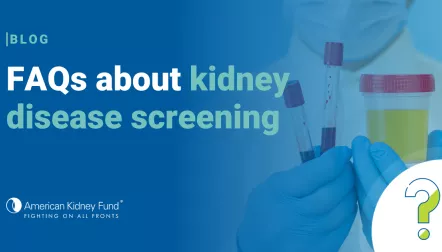
Blog post
'I am always weak and tired': Reflections on living with anemia

When the American Kidney Fund (AKF) launched the ACT on Anemia campaign in 2016, our goal was to increase awareness of the connection between kidney disease and anemia.
Because the kidneys help regulate the production of red blood cells, anemia is a common side effect of kidney disease. In fact, anemia can be an early warning sign of kidney disease, and it often gets worse as kidney disease gets worse.
But neither anemia nor kidney disease is well understood. A quiz on our website helps people find out their risk for anemia and how to identify symptoms of anemia.
We reached out to some of the people who took the quiz to find out what their experience with anemia is like. Here's what they told us.
Anemia affects many aspects of their lives
Two hallmark symptoms of anemia — tiredness and feeling cold — came up over and over in the responses. For some, the tiredness is debilitating: "I had to stop working because I was always falling asleep on the job," says Barbara. Cynthia tells us that anemia also "affected my livelihood. I was bedridden most of the time." Another respondent, Deborah, notes that "With anemia, I have intermittent tiredness. It often prevents my performing some of my daily routines and affects plans that I make."
Brenda says anemia makes her lethargic. "I do try to conserve energy for very important things," she says. "Sometimes there is success, sometimes not."
You can have anemia and not know it
Allen says he did not know he had anemia. "I didn't know I had a problem until my doctor did a blood test," he says. "Make sure you see your doctor. It's a serious disease."
Anemia is most common in people who have diabetes, heart disease or high blood pressure, or who are Black or older than 75. Anemia can happen with or without symptoms, and many of the symptoms can also be caused by other problems. The only way to be sure you have anemia is to get a blood test.
Pay attention to the symptoms of anemia
Some common symptoms of anemia are dizziness or loss of concentration, pale skin, fatigue or weakness, shortness of breath, cold intolerance and chest pain.
"Anemia can be a warning sign that something worse is happening in your body," says Barbara.
Anemia in kidney disease can increase your risk of heart problems because the heart has to work harder to provide blood to your body.
With treatment, anemia is manageable
All respondents agree that treatment of anemia is important to their quality of life. "With the right diet and nutrients, plus medications, anemia can be alleviated," says Brenda. "With kidney disease, healing a person with anemia is quite a task, but it can be done."
Joyce says it is important to ask questions: "Work with your anemia doctor to manage your anemia. Don't be afraid to ask questions or get second opinions. Work with your dietitian."
Even with treatment, living with anemia can be challenging. "Be realistic about the fact that you have anemia and don't get depressed when you're not able to do all of the physical things that you want to do," says Deborah. "When you feel exhausted, take a nap."
Brenda suggests that you "test your limits to see what can be done easily as well as the hard things. And, always keep your spirit upbeat ALWAYS!"
To learn more about anemia and kidney disease, visit KidneyFund.org/anemia. The ACT on Anemia campaign is made possible by Akebia Therapeutics, Inc.





